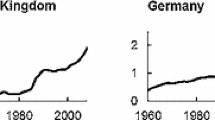Abstract.
This paper analyzes the determinants of immigration flows to Germany in a time series-cross section framework. The reduced form of a well established theoretical model is estimated for a sample of 17 sending countries and a period covering 1960 to 1994. The estimates are then used to perform out-of-sample forecasts to assess the immigration potential from the Eastern European accession candidates to Germany. These scenarios predict a moderate increase in immigration to Germany, especially for the first round accession candidates.
Similar content being viewed by others
Author information
Authors and Affiliations
Additional information
First version received: July 1999/Final version received: July 2000
Rights and permissions
About this article
Cite this article
Fertig, M. The economic impact of EU-enlargement: assessing the migration potential. Empirical Economics 26, 707–720 (2001). https://doi.org/10.1007/s001810100078
Issue Date:
DOI: https://doi.org/10.1007/s001810100078




